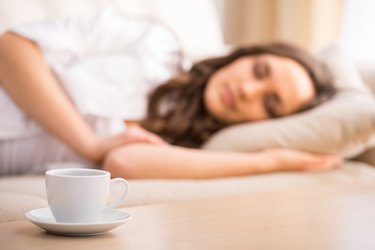
If you experience bad dreams or nightmares frequently, there are some herbal supplements that you will want to avoid. Nightmares are a universal experience and account for up to 70 percent of all dreams in adults. Herbs that increase anxiety and depression or affect hormones and neurotransmitter levels may increase the frequency or the vividness of bad dreams. If you are prone to bad dreams, consult with a registered medical herbalist and a doctor to determine if a herbal supplement is OK for you to take.
Caffeine Products
Video of the Day
Products containing significant amounts of caffeine, such as coffee, black tea, green tea, guarana, energy drinks and energy supplements, may increase problems with insomnia and exacerbate nightmares and bad dreams. According to a study published in "The International Journal of Dream Research" in 2009 by the Central Institute of Mental Health in Germany, people who have insomnia are more likely to experience bad dreams and nightmares during sleep. When you go through periods of insomnia, sleep deprivation and fatigue may cause heightened stress and anxiety, leading to an increased frequency of nightmares. Any caffeinated products that stimulate the nervous system increase anxiety and prevent normal sleep cycles should be avoided in the late afternoons and evenings.
Video of the Day
Griffonia Bean
Griffonia bean is an herbal supplement often marketed in supplements for its high content of a serotonin-precursor called 5-hydroxytryptophan, also known as 5-HTP. Taking griffonia bean as a herbal supplement can increase serotonin levels in the body and have a significant effect on dream experiences. In a study published in "The Journal of Sleep Research" in 2001, researchers from Harvard Medical School investigated the effects of SSRI drugs on the content of dreams. By increasing serotonin levels, patients experienced more intense dreams that often had increased levels of bizarreness. Use griffonia bean supplements with caution if you are prone to nightmares, and consult with a doctor before combining it with prescription medications or foods high in tryptophan.
Valerian Root
Valerian root causes some people to experience more vivid and powerful dreams. In a study published in "Human Psychopharmacology" in 2001, researchers from the Psychopharmacology Research Group in the UK studied the effects of valerian root on patients with stress-induced insomnia. While valerian significantly improved symptoms of stress and anxiety, it also had a side effect of increasing the vividness of dreams. Researchers concluded that valerian has a direct action on REM sleep because it contains iridoid chemicals and essential oils that stimulate both serotonin and opioid receptors in the body. If you already are prone to bad dreams, valerian root may potentiate the vividness and effect of your dreams and should be avoided. Consult with your doctor before purchasing valerian root products.
St. John's Wort
St. John's wort may increase the frequency or the vividness of bad dreams in some people. While St. John's wort does relieve mild depression, anxiety and stress that contribute to bad dreams and nightmares, the effects of its phytochemicals on serotonin, benzodiazapene and GABA receptors may result in increasingly vivid dreams as well. According to Kerry Bones and Simon Mills, authors of "Principles and Practices of Phytotherapy," St. John's wort contains chemicals that affect the nervous system and stimulate receptors for neurotransmitters, including hypericin, hyperforin and pseudohypericin. Use St. John's wort with caution and stop using it if bad dreams and nightmares become stronger, more vivid or more distressful. Do not combine St. John's wort with prescribed medications.
Hops
Hops are Ea traditional folk remedy for insomnia and sleep disorders, often placed in herb pillows to induce sleep. However, according to Susanna Lyle, Ph.D., author of "Eat Smart, Stay Well," hops also act as a mild depressant on the nervous system. The flowers contain acids called humulone, lupulone and valerianic acid, which sedate the nervous system and may exacerbate symptoms of depression. If you experience bad dreams, sleep disturbances and nightmares that are related to depression, avoid taking hops products. Consult with a doctor and a registered medical herbalist to determine if hops are OK for you to take.
- "International Journal of Dream Research"; Nightmare Frequency in Patients with Primary Insomnia; Michael Schredl; 2009
- "Human Psychopharmacology"; Stress-induced Insomnia Treated with Kava and Valerian: Singly and in Combination; D. Wheatley; 2001
- "American Family Physician"; Nightmares and Disorders of Dreaming; J.F. Pagel; 2000
- "Psychology Today": Nightmares